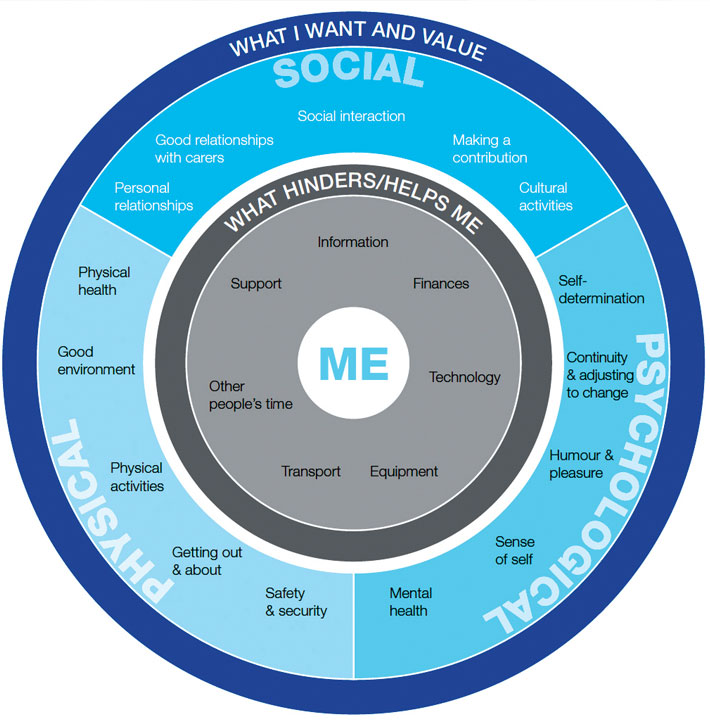For those in need of homecare
All of us, regardless of age, need opportunities to show others who we are and to feel good about ourselves.
By Jane Teasdale
What do older people who need a high degree of physical and mental support say they want and value in their lives? This question was posed by a report from the UK-based Joseph Rowntree Foundation entitled A Better Life—What Older People with High Support Needs Value. The report made a number of key observations, some of which are discussed in this article.
According to the report, “Older disabled people are generally still viewed through the ‘medical model’ (in which the focus is on the impairment) and the discourse is one of dependence, care, dignity, frailty and pity…The focus has been on their needs in relation to services, rather than their broader aspirations in relation to their lives…
“Older people want to be able to hold on to the parts of their lives that represent continuity between past, present and future and to maintain as much control as they can over their daily lives. This is vital to a continuing sense of self, and in order to promote certainty, security and self-esteem while adjusting to changing circumstances. Older people with high support needs often find themselves having to make difficult decisions to balance independence, support and risk, and the research shows that they may find it particularly hard to do this where their sense of self is threatened…Many older people with dementia want and are able to tell us about their views and experiences, even if they are confused about some factual details of their lives.”
To date, the private and public homecare service model has largely been built around the delivery of personal support and, to a lesser extent, medical assistance. This is clearly a very important base, but it fails to address the individual’s personal, social and emotional needs, as well as his or her desires and objectives, which in turn drive enjoyment and provide reason for living.
A more complete model of care
Together, families and professionals can make sure information about an individual’s life history, interests, hobbies, challenges, wishes, passions and values is captured within a framework and used to engage the individual, as well as his or her caregivers and family, in an ongoing conversation. This should be a “journey of discovery” that allows the individual’s character, vitality and contributions to shine through. This conversation can be used to highlight and focus on colourful and vibrant areas of interest, around which activities can be organized and opportunities for exploration identified. For the individual, the caregiver and the family, this becomes a journey of self-actualization and meaning.
Of note: I am not talking about the long-form questionnaire usually completed at the start of service that collects administrative, medical and health information and is then usually filed away for future reference. Rather, the practice I am describing is an ongoing interactive process that occurs on a level outside of the “medical model” referred to in the Joseph Rowntree Foundation report.
This conversation—this buildup of the meaning of the person—can be used to help engage with individuals and to develop interactions with people as well as activities, events and opportunities that, for a while, might have lain outside of that person’s immediate grasp and the professional’s knowledge.
 A new paradigm for caregivers
A new paradigm for caregivers
The Joseph Rowntree Foundation report continues: “To enable personal autonomy, it is necessary to consider things that can be done differently to help older people with high support needs achieve and retain the things they value in life, rather than simply assuming they no longer have the motivation or ability to participate.”
Caregivers (both professionals and family members) need to be educated about the value of social interaction to ensure they connect with older individuals in a more meaningful way. In some cases, it might be worth providing special training on how to communicate effectively with older adults with complex care needs.
Organizations providing homecare can also become more community focused. By that, I mean developing relationships and connections with resources in the community that can help the individuals being cared for, and their families, to develop and maintain social contact and personal interests.
My team at Mosaic Home Care Services & Community Resource Centre has developed and instituted a personalized conversation framework, “The Meaning of Me,” around which we deliver lifestyle services and activities. We have two community resource centres where we regularly hold educational and fun events for people in the community. These events provide information on the hundreds of community resources available to our members and their families. This integration into the community helps to inform staff, caregivers and clients alike of opportunities for development and exploration of the self.
Cognitive, aesthetic, emotional and social needs can become more important to individuals as they age, for a number of reasons. We believe that a focus on unearthing, developing and giving voice to the rich habitat of the mind and the being goes hand in hand with high-quality delivery of basic care services.
Simply put, we are not talking about patients and their frailties, disabilities and care needs. Rather, we are encouraging homecare providers to discover and continue to enrich the lives of individuals with valuable, ongoing life experiences—these individuals still have much to contribute!
The homecare services model of the future must put individuals, their families and their communities at its centre, and develop service structures that meet these very important life and lifestyle needs.
Jane Teasdale is the Director of Business Development and Owner of Mosaic Home Care Services & Community Resource Centre (www.mosaichomecare.com).














